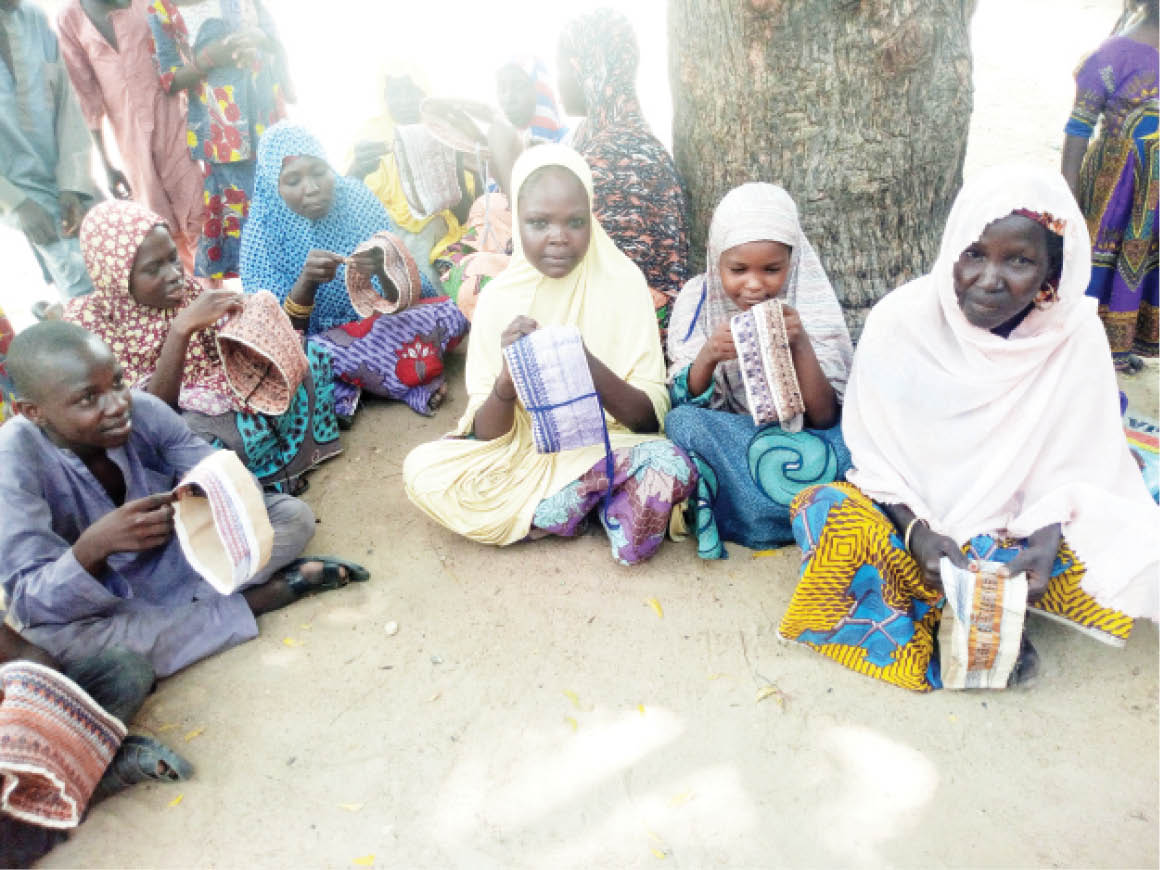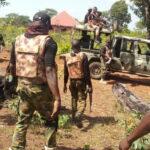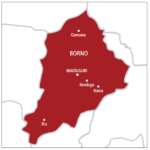After Boko Haram sacked Bama, Borno State, in 2014, residents of the area have finally been able to return home. However, starting their lives from scratch is tough, especially for women forced to become breadwinners, trading sexual favours in return for food and sustenance, after losing their parents or husbands in the violence, as our correspondent reports.
Successive waves of attacks by Boko Haram in 2014 displaced residents of Bama town, Borno State and adjoining villages. The residents fled their homes and sought refuge in other communities and displaced persons’ camps. The insurgents took over the town and remained there for seven months.
Almost all major settlements in the area and around the border with the Cameroon, such as Banki, Pulka, and Gwoza, too, were reportedly seized. Thousands of people have been displaced. One of them is Hawwa, who is in her 50s.
“My husband fled during a raid but I refused to go with him because of the children. We stayed side by side with the insurgents in Gwoza for several days. They restricted our movements but we usually ran to the bush with the children to take cover against airstrikes. I was once flogged by the insurgents with a leather belt for refusing to marry one of them,” she said. “I later sneaked away with the children and reunited with my husband in Yola after the fighters abducted a 13-year-old boy from me. I never heard anything about the boy since then.”
Aisha Bukar too fled from Gwoza with her husband and children after an attack. She lived in three different camps in Adamawa before relocating to Bakassi Camp in Maiduguri.
In the end, Gwoza was ‘liberated’ and the majority of the inhabitants have since returned with the help of the government and security forces.
Also, the state government and security forces were also said to have conducted an assessment of threats, vulnerabilities and risks as well as safety and security operating conditions before rebuilding houses in Bama ahead of the arrival of returnees, mostly from Maiduguri, the state capital.
Soldiers and local vigilante groups patrol the road from Maiduguri to keep an eye out for any threat. Motorists can only ply the road between 9 am and 5 pm in most cases and passengers are required to disembark from their vehicles, present identification documents to the police before leaving Maiduguri and walk past a checkpoint. This process is applied in similar checkpoints in Konduga area before Bama.
Vehicles travelling farther, to Gwoza, Pulka and Banki, have to converge at Bama and are escorted by soldiers.
“It is a very difficult assignment,” one soldier said, “because troops have to ensure that the road is safe including using devices to detect land mines and booby traps. That is why passengers are asked to spend some hours in Bama before they are escorted.”
An official of the National Union of Road Transport Workers (NURTW) in Bama said giving armed escorts to travellers is a positive development because it has helped avert danger. He also suggested the provision of public conveniences for the hundreds of passengers who have to spend the night before moving on.
During a visit to the town earlier in September, the sparse population of returnees were seen going about their businesses without fears and with few hitches. Vulnerable persons, including girls, have restarted their daily routines including small-scale businesses and trades. Women and young girls have resumed their crafty cap sewing work, which when completed could fetch them a decent amount.
Muhammed Ibrahim, who returned to Bama in 2018 after he fled with his family, said his daughter spent most of her time making caps and that “she had completed and sold two for N3, 500 each.”
The people of Bama, he said, have excelled in the ancient tradition of cap making to the extent that “a little while ago, apprentices came all the way, from an Asian country to learn the art in Bama and I will not be surprised to see similar caps being made in mainland China, in the near future.”
Yet not everything is rosy. Many of the returnee children could not continue their education because there is only one public junior secondary school in the town. A number of houses are yet to be rebuilt while a senior girls’ school was converted to a temporary settlement for thousands of displaced persons.

There are complaints of lack of social services as well as shortages in food supply. Farmers are scared to cultivate farms located far away from their town due to fear of terrorists who might be lurking in the wilderness. Fears of a looming food crisis in the area rising. Unless authorities intervene.
Waziri Kyari, one of the returnees, said residents faced some key challenges and hardly got humanitarian support. The truncated distribution system means there is a short supply of commodities, especially food items at the marketplace. This has pushed up the prices of food and increased the suffering of low-income earners.
“Because of the limited supply of foodstuff in the markets, retailers decide the number of grains to sell to customers who have no option than to comply. I wanted to buy enough maize for my family yesterday but the man selling said I can only get three measures. This is what is happening mainly due to the short supply of food items,” he said.
The fear of surprise attacks and kidnappings by insurgents has prevented the cultivation of outlying areas and the rearing of livestock. This fear, according to Muhammad Musa, another returnee, is affecting the wellbeing of the returnees.
“Residents whose farms are located at least one kilometre from the town were forced to abandon farming for fear of attacks. The common source of income and livelihood here is farming which is no longer safe,” he said.
He too, like Kyari, laments about the prices of food. As at September, when our correspondent visited, a measure of maize is N650 while that of guinea corn is N550.
“What baffles one is that most of the retailers refused to sell more than three measures to each buyer in an attempt to either ensure food circulation or market monopoly,” he said.
According to him, many residents who could not buy enough grains from the markets due to strict ‘rationing,’ patronized the displaced families who sold parts of their ‘insufficient’ food supplies to buy other commodities.
A source who pleaded for anonymity said, “The displaced persons living in the temporary camp usually receive the donation of food items once in three months but the amount given is not enough. Regardless of that, they sell part of the foodstuff to buy other essential items.”
A number of women were seen outside the camp looking for firewood to cook. The source said the uncertainty of living conditions has left many of the women confused. Some of them don’t know their husbands’ whereabouts for five years.
Some of the men abandoned their women during attacks. Others were killed. A few others reportedly joined the insurgents. The wives of such men were detained by authorities, the source said.
“Thousands of women and young girls were abducted and forced to marry the terrorists before they were freed in different military operations after bearing children. Others escaped from captivity; those who could not reunite with their basic social units or extended families as well as those whose settlements were deserted, live in temporary shelters in displaced persons’ camps.”
“Those who are helpless, engaged in sexual acts for payment, just to earn some money to support their kids and buy essential things but there are young girls who have to satisfy their libidos,” the source said.
According to the source, the government was not responsible for the provision of food to IDPs in Bama.
Ali Bulama, who worked with an interest group in Bama, Gwoza, Dikwa, Baga as well as many other adjoining local councils said his organization had facilitated dialogue between aggrieved parties, including the insurgents and community members.
He said most of the married women and young girls abducted and forced to marry insurgents have been freed and live with their kids in camps waiting to be reunited with their communities or loved ones.
“Majority have yet to find out where their husbands or immediate families are but few others who were reunited with their families suffer stigmatization and had to return to camps with their kids. People, including parents, no longer trust the women by virtue of the fact that they have stayed with the insurgents, one way, or the other.
“This is why some sneaked out and returned to the insurgents in the bush. Others will not return but befriended men within or outside the camps,” he said.
He said most of the women abducted were those who refused to run away during raids and preferred to stay with their kids.
He said displaced women in the camp, like all other inhabitants, get food aid sometimes once in three months. And they have to scavenge for firewood to cook. He said the women had met and dated different men and could easily ‘fall into sex traps.’
Hamsatu, a woman in her 30s was among the displaced women in the camp. She said she was a native of Adamari village and had stayed with the insurgents for months before she was freed.
Two other women in her age bracket said they had not seen their husbands for years and did not believe they would return home. They consider themselves as single mothers “who had to do many things to survive.”
The eldest among them admitted that only the law could dissolve her previous marriage to allow her to find another husband.

Another woman, who gave her name as Bana, also said promiscuity was common among the displaced women because of different reasons, one of which was lack of contact between husbands and wives for long.
All the women interviewed pleaded with the government to come to their aid and said they wanted to remarry since their husbands could not be found.
“I am still young,” Bana said, “I need to be in my matrimonial home but only the authorities can give us clearance to leave the camp and reunite with the society. This will enable us to find suitors and marry.”
A displaced teenage girl seen near the Bama Local Council Secretariat described the sexual relations of women in the camp as ‘something not unheard of,’ but admitted that majority of the victims were forced ‘into such relationships’ because they had limited access to basic needs and lacked income.
“We sell sex to make money to make a living because we have limited access to food aid which comes once in three months,” she said. “There is no other source of income. And there are male partners ready to patronise us including public servants.”
She said most of the displaced persons were willing to engage in farming to earn money but the farms were not safe to work on due to frequent ambushes by insurgents.
“Last year, we were abducted on a farm where we went to work. I spent eight months with the insurgents before I was freed,” she said.
The displaced girl said she had lived in various IDP camps for six years because the whereabouts of her parents was unknown.
Governor Babagana Zulum had, in August this year, told the Senate Committee on Special Duties in Maiduguri that the state was complimenting efforts in the provision of food supplies to displaced persons, adding that the sum of N1 billion was spent on the provision of food and non-food items to displaced persons Monguno.
“The food items that we have provided to the IDPs there will not take them for more than one month considering the extended family system that we have in the state. And you can understand my frustration and that is why we want people to go back to their homelands in a dignified manner so that they can engage in their means of livelihood. That is the only solution,” he said.
The governor also admitted the rise in social vices in the temporary settlements for displaced persons including illicit sex.
He said, “Right now, we have increase in prostitution, procreation, drug abuse and gangsterism in our IDP camps.”

 Join Daily Trust WhatsApp Community For Quick Access To News and Happenings Around You.
Join Daily Trust WhatsApp Community For Quick Access To News and Happenings Around You.


